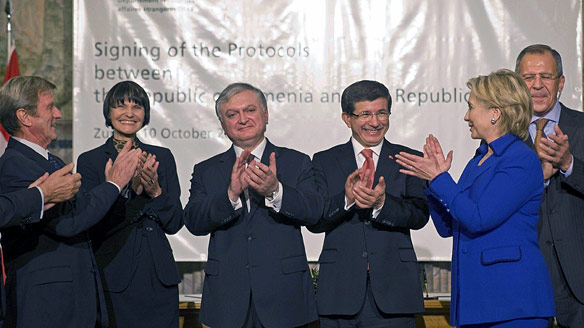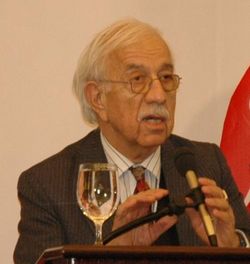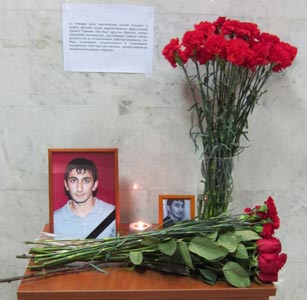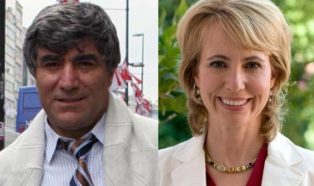By Hovhannes Nikoghosyan
As the New Year holidays come closer – an ideal time to sum up developments of outgoing year, crossing fingers for a better year of 2011 in the back.
As a good colleague of mine Ömer Taspinar from Brookings Institution has pointed out in an essay recently, the intense times for this two estranged nations has begun earlier than usually in 2010. The news headlines of late 2009, after Zurich, had been rather optimistic, with me cheering it. While policy-makers elsewhere had been predicting a Nobel Peace Prize for Presidents Abdullah Gul of Turkey and Serzh Sargsyan of Armenia, some people really felt ignored and back-staged of it.
Azerbaijan’s continuous pressure on Turkey, urging to link rapprochement with Karabakh peace process, and, as Wikileaks quotes (Cable of 10BAKU134), delaying the gas export deal as blackmail to Turkish Government, played another major role in the current deadlock. While the protocols clearly detached these two issues, but still this play proved to be rather a comfortable exit strategy for Turkey to rely on. Late February 2010 the shift in Turkish policy was clear, as FM Undersecretary Firudin Sinirlioglu began appealing to “simultaneity” between Armenian Protocols ratification and the Minsk Process (Cable 10ANKARA302), while international mediators rejected it. In an effort to escape domestic escalation and, perhaps, feeling betrayed by the partners outside, President Sargsyan issued a timely decree on April 22 suspending the ratification process in the National Assembly, but still leaving it in the agenda.
Earlier of that, the passage of the Armenian Genocide affirmation resolution (HRes252) by a slight majority at U.S. House Foreign Relations Committee on March 4, followed up by another resolution in Swedish Parliament have shut down the process in American and European dimensions. To my mind, this clearly demonstrated to Turkey the uneasiness and hesitation of Europeans and Americans to drop “Armenian issue” from their agendas, and keeping it, in the words of Turkish FM Prof. Ahmet Davutoglu, as the sword of Damocles above the head of Turkey.
Russia took the initiative and sponsorship on Nagorno Karabakh process very timely, while at the end of the year cannot afford compliments of any success either.
In August the region of South Caucasus both Armenia and Azerbaijan concluded military treaties, respectively, with Russia and Turkey – all under Article 51 of UN Charter. As the Parliament of Azerbaijan ratified the treaty these days, the major difference of the two became clear. While Russian-Armenian pact speaks only about defending Armenia in case of direct aggression, the Azeri-Turkish pact of strategic partnership, partly unveiled, also prescribes assistance “to restore regional peace and security”. When the bellicose rhetoric from Azerbaijan becomes louder on resumption of hostilities against Nagorno-Karabakh Republic, one may remember the four UN Security Council resolutions, where the situation in Nagorno Karabakh was determined as “endanger[ing] peace and security in the region” (UNSC Res 884). Though I hope I will be the only scholar to see the linkage.
Thus, the region was kicked off to XIX century, when the security was generally guaranteed by the treaties of mutual (military) reassurance, instead of expanding trade and synchronized economic development.
The OSCE Astana Summit was the clear indicator of the deadlock we are currently in. The good news, if it may be good at all, was that the geopolitical situation in South Caucasus is a microcosm of the greater deadlock “from Vancouver to Vladivostok”. Thinking post-factum, with Russian President Medvedev’s European security architecture falling apart and Astana remaining unattended by Presidents Barack Obama and Nicolas Sarkozy, global policies in South Caucasus could not be better. The Armenian delegation being resistant to, what they call, any meaningless meeting with Turkish colleagues in Astana, the only thing both Presidents could afford was nodding to each other and wishing good health.
Regarding Karabakh process, if there is one, besides the scheduled Minsk Group mediated meetings, in a wider canvas – the deadlock is in minds of politicians. A very recent report called “Karabakh: A Big Debate”, made of interviews of Armenian and Azerbaijani political party leaders (interviews of NKR parties and organizations coming in March 2011), suggests that the majority of Armenian parties support Minsk Group process, a wider European engagement and negotiated solution; while their Azerbaijani colleagues speak of a greater place for Turkey, again supportive of EU soft role, they don’t trust Minsk Group, and, worst of all, far majority is sure that the only viable solution is paved through resumption of new war.
Though I wish I were a better optimist.
Hovhannes Nikoghosyan is a research fellow at the Public Policy Institute in Yerevan, Armenia, where he contributes the regional security agenda.










